On January 18 -19, ZUFE convened a meeting for middle-level cadres to initiate the "New Finance and Economics Strategy" Action Plan. The leadership team, including Li Jinchang, Wei Jiang, Zheng Yali, Wang Kuiquan, Sun Xudong, Li Zhanrong, Xu Xiaodong, Dong Jincai, Cheng Shuang, and Shn Tuli, were present alongside all middle management.
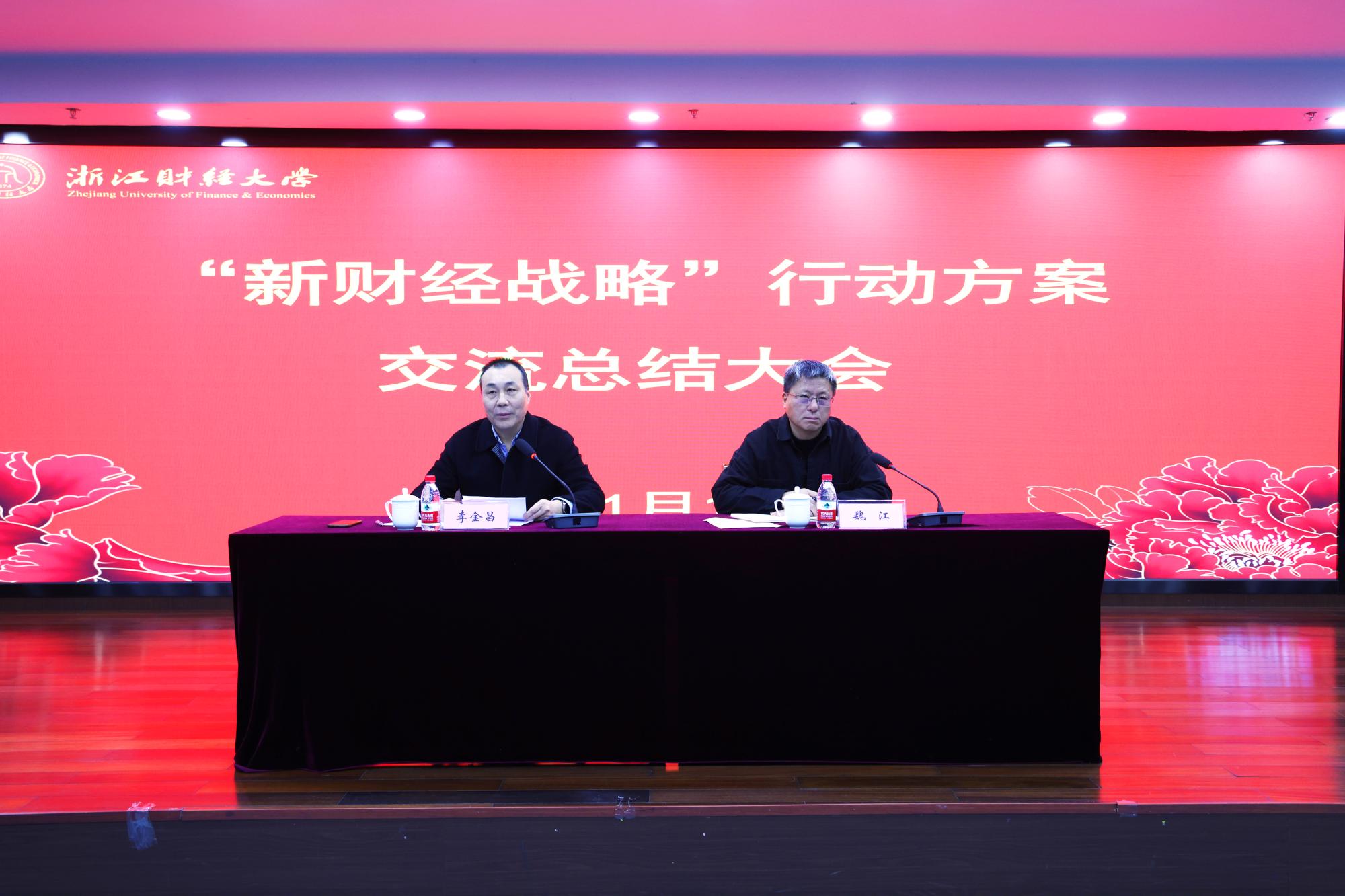
Li Jinchang, Secretary of ZUFE's Party Committee, stressed the significance of this first meeting following the new round of selections and appointments of the university's middle management. He highlighted that the meeting serves dual purposes: it marks the commencement of the "New Finance and Economics Strategy", ushering in a new phase of transforming ZUFE into a high-level university of finance and economics. Concurrently, it is a pivotal session for reinforcing ZUFE’s commitment to responsibility, ensuring that the university maintains a steadfast focus on the meticulous execution of the tasks. He also stated that the meeting was pragmatic and efficient with a clear theme and rich content, successfully unifying the participants’ vision, deepening their understanding, invigorating their spirits, and inspiring the university. This has bolstered the confidence of the entire university, providing a more defined blueprint for the journey towards a high-quality institution, and elevating the university’s collective energy and morale.
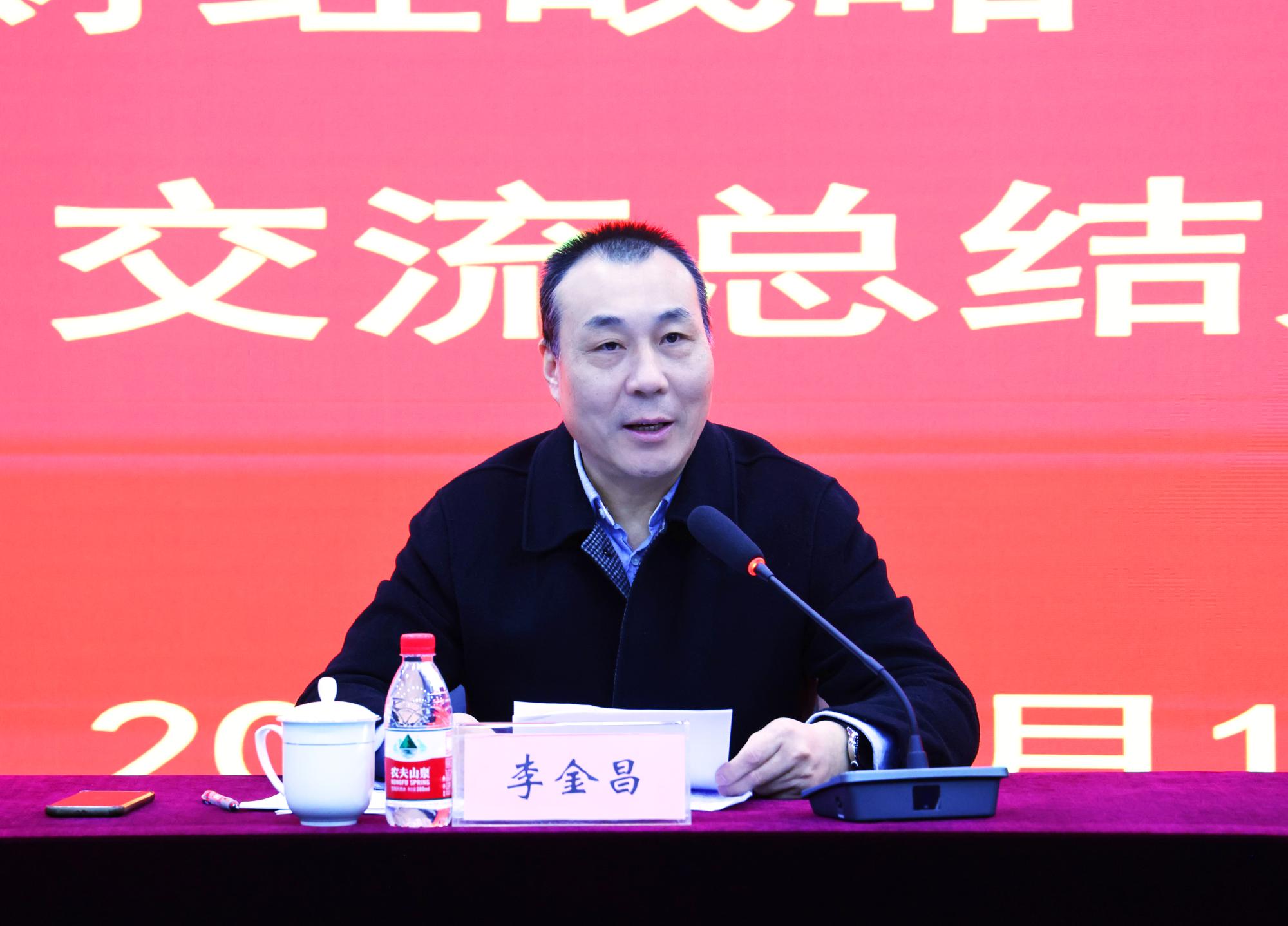
Li Jinchang outlined three requirements for implementing the spirit of this meeting. Firstly, he stressed that emphasizing the principle of "strategic planning" was crucial. It is imperative to adopt a high-level perspective, approaching our work with a mindset of continuous learning and a constant awareness of being tested. We must deeply understand General Secretary Xi Jinping's strategic insights on education, considering its political implications, its impact on people's livelihoods, and managing it according to its fundamental principles. Keeping the country’s top priorities in mind, we should fully integrate and expand upon the achievements from our thematic education initiatives across all facets of teaching, research, management, and service. We must focus on strategic planning. In implementing the "New Finance and Economics Strategy", it is crucial to fully and accurately grasp the university's strategic decisions and their deployment, as well as the actual work of each department or unit. We need to identify key integration points, areas to focus efforts, and opportunities for breakthroughs, and then swiftly develop and implement an effective plan.
Secondly, we must commit to action. A shift in our work style is essential for ensuring implementation's success. No matter what tasks we undertake, each endeavor must be grounded in substance, significance, and efficiency, striving for a realistic mindset, a pragmatic approach, and solid execution. We should take the initiative and set an example by spearheading the implementation of key tasks, resolving bottlenecks and difficulties that affect the university’s development, and driving innovation within our mechanisms. Embracing a task-oriented checklist approach is vital; we must ensure each task is completed on time, every initiative yields results, and an effective feedback loop is established. We must strengthen the application of results, honor excellence, and ensure accountability to foster an atmosphere where the advanced individuals continue to excel and those who are behind strive to catch up.
Thirdly, we must emphasize the importance of unity and collaboration. We must foster a broader perspective and deepen our collaborative efforts, focusing not only on individual responsibilities but also on the collective good. We should coordinate and move forward in unison, aiming to amplify the "1+1>2" synergy and cultivate a team culture that values practicality and proactivity and excels in execution. To strengthen the integration of forces, we must break away from spontaneous and disorganized state, enhancing organized action through the coordinated efforts of research, service, and publicity. By promoting this synergistic approach, we can leverage the power of collective action and forge a powerful collaborative force for our work.
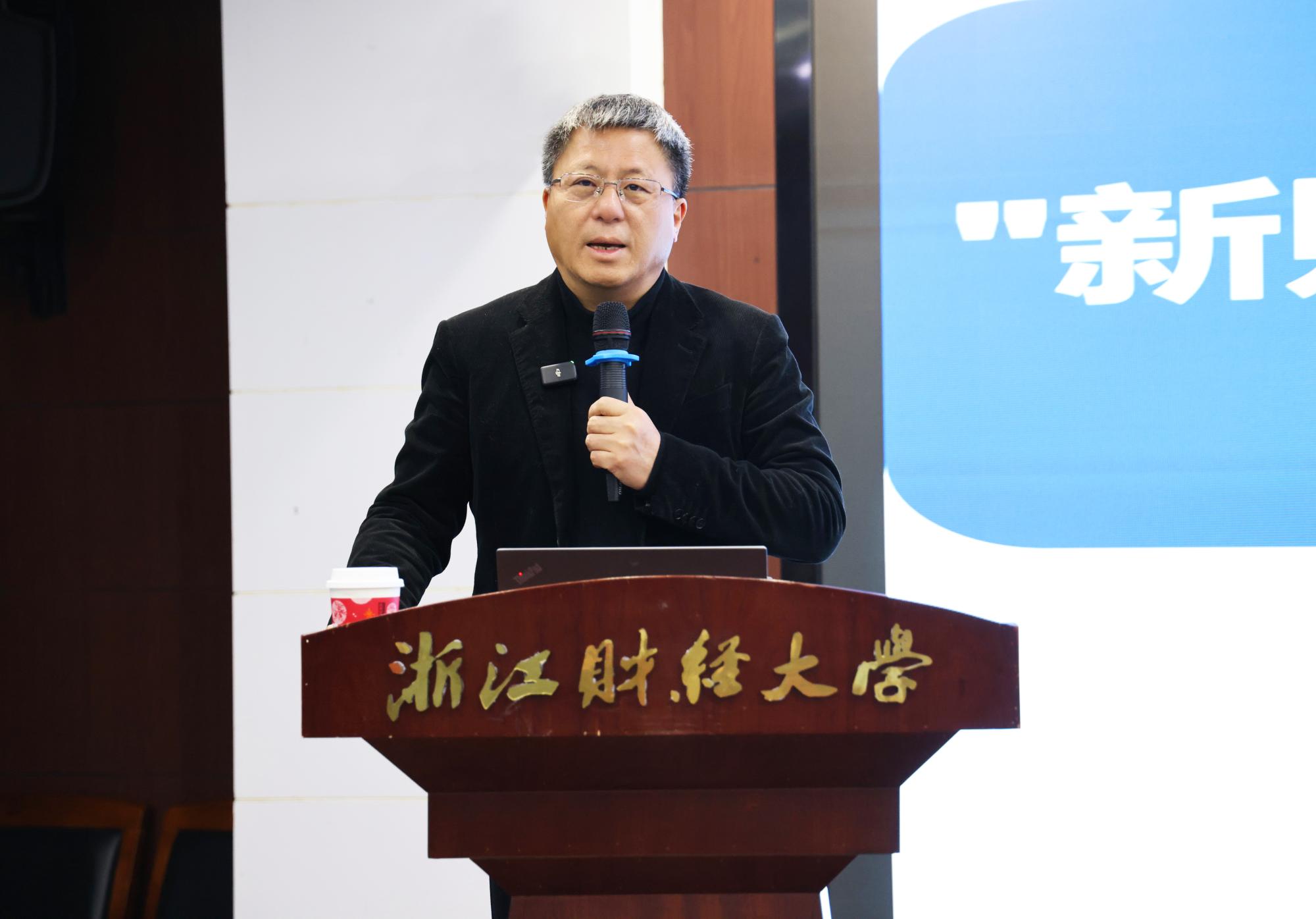
Wei Jiang, Deputy Secretary of ZUFE's Party Committee and Vice President (in charge of daily executive work), delivered a special report on the "New Finance and Economics Strategy". Wei Jiang provided an extensive interpretation and deployment plan for ZUFE's "New Finance and Economics Strategy" action from six aspects: strategic background, foundation and shortcomings, visions and missions, principles and ideas, major tasks, and organization and implementation. He said that the past year has been a milestone year, during which the whole university was invigorated and achieved a major breakthrough, turning the impossible into possible outcomes. In the future, ZUFE should promote reform and development with a new atmosphere and spirit, solidly advance ZUFE's development as a provincial high-level university and its top-tier disciplines, and achieve new breakthroughs in development and a transformative shift in education.
Wei Jiang stressed that the "New Finance and Economics Strategy" is devised to meet the needs of the new era of "promoting the great rejuvenation of the Chinese nation with Chinese-style modernization", which involves grasping the development trend of higher education against the background of the rising digital economy and self-reliance and self-improvement in science and technology. The strategy aims to explore the laws of talent cultivation, knowledge production, and disciplinary development, blazing a development path with ZUFE's characteristics. It is an essential requirement for implementing the university's 14th Five-Year Plan (2021-25) and the Second Party Congress, as well as for its advancement as a high-level university.
Our university should adhere to the guidance of Xi Jinping Thoughts on Socialism with Chinese Characteristics for a New Era, thoroughly implement the spirit of the 20th CPC National Congress and Xi Jinping's key exposition on education, root itself in Zhejiang, serve the nation, and go global. Our university should comprehensively promote the "New Finance and Economics Strategy", led by a new disciplinary system, built upon a new talent-cultivation system, supported by a new ecological system, and guaranteed by a new governance system. Our university should make concerted efforts, carry out reform and innovation, implement the idea of "high-quality development as of paramount importance in the new era", and fully promote the construction of a "high-level university of finance and economics with distinctive characteristics".
Wei Jiang stated that ZUFE will build a new discipline system to promote the "digital intelligence ×", "technology ×", and "industry +" models, thus forming a disciplinary development pattern that integrates disciplines, research, and talents. ZUFE aims to revamp its talent-cultivation system by integrating cutting-edge technology with holistic education models. It seeks to create a comprehensive framework that harmonizes academic disciplines (majors), extracurricular organizations, curriculum design (courses), and ideological and political education. The ultimate goal is to establish an innovative model that fosters excellence in technological literacy and personal and professional growth.
ZUFE is set to build a new education ecosystem by adopting a holistic approach that advances finance and economics by transcending traditional boundaries, harmonizes internal operations with external partnerships, and fosters excellence through meaningful contributions. This comprehensive transformation will ultimately drive development through service provision and propel the institution towards achieving outstanding results. ZUFE needs to optimize its governance system, adopting a more agile and adaptive approach that prioritizes values and outcomes. To achieve this, the institution will reconstruct its discipline system by actively breaking down barriers between disciplines and organizations, fostering a culture of collaboration and innovation. Additionally, ZUFE will explore new ways to operate through a platform-supported-and-project-based approach, leveraging technology to streamline processes, enhance engagement, and drive results.
ZUFE should cultivate "Exemplary ZUFE Students" through its new student talent cultivation system, construct an independent knowledge system through its new discipline system, serve social development through its new education ecosystem, assist in building a community with a shared future for humanity through cultural inheritance and innovation, and create new advantages for development through international exchanges and cooperation.
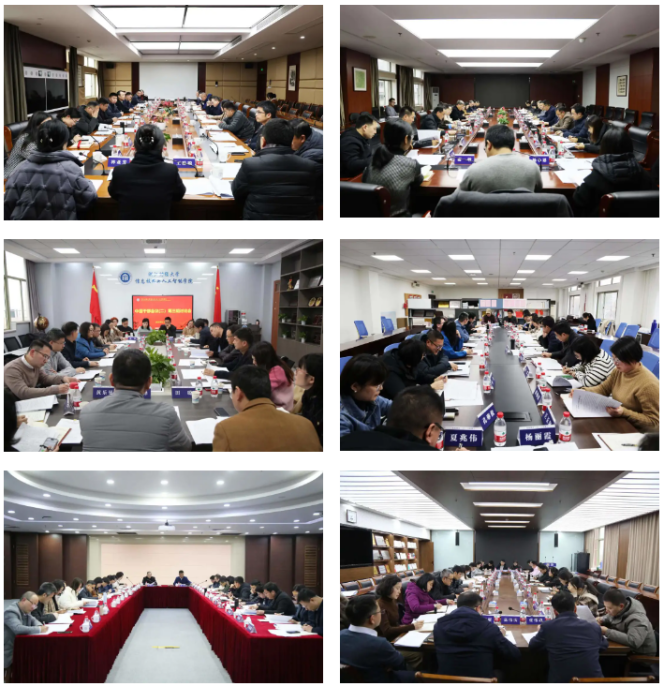
In panel sessions, ZUFE's leaders and middle management engaged in constructive dialogues, offering targeted suggestions for implementing the "New Finance and Economics Strategy". The sessions fostered a warm and lively atmosphere. In subsequent group exchanges and reports, participants unanimously agreed that the action plan is ambitious, well-directed, and inspiring. Now equipped with a clear roadmap, ZUFE embraces a proactive mindset – "struggling from the start" and "sprinting ahead" – to forge a new era of high-quality development in its history.
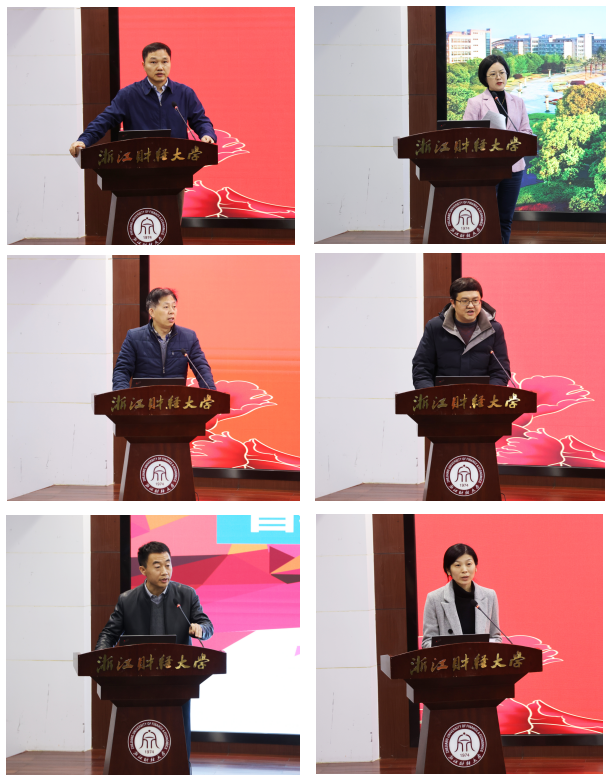
Cao Zhen, Director of the Office of Student Affairs: The action plan for the "New Finance and Economics Strategy" highlights that ZUFE should embrace whole-person education as its mission, comprehensively establishing the MAQ talent cultivation model. Anchored by the "Iron Triangle" of student development, consisting of counselors, project directors, and head teachers, this approach is committed to delivering a full ideological and political education and fostering exemplary ZUFE graduates. We support our students through their entire college journey, from student recruitment to graduation. Moreover, we must shoulder the political responsibility of "cultivating talent for the Party and the State" by uniting all forces for student ideological and political education, embracing proactive change, and actively adapting to evolving circumstances. Together, we will make significant contributions to students’ character development, capability enhancement, and quality education.
He Wuhua, Director of the Office of Academic Affairs: The report of the 20th CPC National Congress underscores the importance of implementing the strategy of rejuvenating the nation through science and education, emphasizing that talent is crucial for achieving national modernization. The "New Finance and Economics Strategy" marks a significant step forward by ZUFE to stay aligned with the pulse of the times, seize opportunities, embark on self-revolution, and take proactive actions. In fostering exemplary ZUFE graduates, we will focus on the “new infrastructure” of teaching, adopt a new mindset and vision of "advancing finance and economics by transcending traditional boundaries", and pursue change and innovation. Moreover, closely aligning with the new objectives of talent cultivation, we will reform our talent cultivation model, reshape the relationship between teaching organizations, majors, and courses, rebuild the underlying organizational system of teaching administration, optimize general education and teaching honor systems, continuously develop top-notch courses, and further establish a high ground for cultivating "New Finance and Economics" talents.
Pei Zhijun, Deputy Director of the Office of Research Affairs: The action plan for the "New Finance and Economics Strategy" is visionary and far-reaching, igniting enthusiasm and boosting confidence. We will focus on the "big", referring to big projects, big achievements, big rewards, and big platforms, to foster "New Finance and Economics" talents. In addition, we will move away from individual silos towards integrated research teams. By fostering joint innovation, emphasizing the disciplinary contributions of our research, and upholding the "harvest every grain" philosophy, we will evaluate our research and academic results based on their academic contributions and strive to advance the "New Finance and Economics Strategy".
Fu Wenlin, Dean of the School of Finance and Taxation: The action plan of the "New Finance and Economics Strategy" invigorates our resolve and instills immense energy in our efforts. Drawing from the imperative of building a world-class university of finance and economics, the 20 tasks laid out in the action plan offer a comprehensive blueprint, addressing the urgent demands and gaps in the development of our university. Notably, the proposal of the “discipline-research-talent” trinity development approach for the formation of the new discipline system is highly instructive for the discipline development of our school. The "New Finance and Economics Strategy" will undoubtedly have a profound impact by enhancing our university's capacity and proficiency in serving the "two priorities" for Zhejiang. In line with all these goals, the School of Finance and Taxation will foster a deeper integration of digital intelligence, economy, and finance and taxation, innovate in our approaches, increasingly improve the levels of talent cultivation, scientific research, and social services, and continuously optimize our faculty composition. In doing so, we aspire to contribute significantly to the further advancement of ZUFE's top-tier disciplines.
Huang Zhiling, Vice Dean of the School of Public Administration: "The New Finance and Economics Strategy" constitutes a systematic scientific system, including a new discipline system, a new student talent cultivation system, a new education ecosystem, and a new governance system. It boasts ambitious goals and effective measures, leaving us deeply inspired. The Strategy not only poses higher demands on us but also provides an impetus for us to fulfill our duties and responsibilities diligently. Guided by the action plan, we will enhance cross-disciplinary integration to develop Level A first-class disciplines in Zhejiang Province. We will cultivate a thriving talent team through focused development initiatives, boosting the high-quality development of the school’s undertakings. Focusing on fostering high-quality research outcomes, we will solidify the foundation of a research-oriented school.
Li Wengui, Dean of the Accounting School: "Integration" is a pivotal aspect in comprehensively and deeply implementing the action plan for the "New Finance and Economics Strategy". In terms of "what to integrate", the construction of new disciplines needs to break down disciplinary silos, align with national economic strategic priorities to foster interdisciplinary convergence in research objectives and content, and enhance team collaboration to evolve from "everyone has a team" to "everyone belongs to a team". Furthermore, the new student talent cultivation system calls for cross-disciplinary curriculum design to facilitate content integration, and a unified approach to curriculum, materials, and case studies to promote integration across teaching, research, and industry. Regarding "how to integrate", it is crucial to grasp the intrinsic logic of each integration component and lay out a comprehensive strategy. Additionally, it is essential to adopt an open-minded approach to redefine functional positioning and to break free from entrenched thinking patterns.
Dai Weiqi, Vice Dean of the School of Management: The "New Finance and Economics Strategy" embodies ZUFE-ers' commitment to sharing the nation’s destiny, showcasing their foresight in planning and courage for self-revolution. A sound strategy demands clarity in both goals and implementation. The Strategy highlights four innovative dimensions: a new discipline system as the guideline, a new student talent cultivation system as the foundation, a new education ecosystem as the support, and a new governance system as the assurance mechanism, which will inject a powerful impetus into ZUFE’s development over the next five to ten years. Subsequently, under the guidance of the university’s CPC Committee, we will operationalize the Strategy, meticulously plan the "four blueprints" for the school’s reform and optimize talent utilization to ensure tangible reform outcomes.
Deng Xiaojun, Vice Dean of the School of Economics: The "New Finance and Economics Strategy" report is truly inspiring. We have embarked on a comprehensive revamp of our undergraduate programs, pioneering the province's first digital economy major. To bolster this initiative, we’ve tapped into our existing faculty, recruiting teachers with expertise in digital economy education and research, and established a dedicated digital economy department. Our faculty members have collaborated to co-author textbooks and deliver a shared introductory course. What’s more, we are establishing of a provincial digital economy research consortium, aiming to foster a high-caliber major with a solid foundation. We are also poised to initiate reform in talent cultivation, reshaping our talent cultivation objectives in terms of positioning, level, and specialty.
Liu Bo, Vice Dean of the School of Data Sciences: President Wei's inspiring report serves as a detailed interpretation and systematic deployment of ZUFE's "New Finance and Economics Strategy" from six key aspects, outlining a clear blueprint for the university’s vigorous future development. Going forward, we will always be guided by the spirit of the report, conscientiously perform our duties and actively seek changes to create a highland for the statistics discipline and foster an interdisciplinary approach to academic research with more distinctive characteristics. We will actively cultivate our first-level master's program in mathematics, and give full play to the synergistic and supporting role of statistics and mathematics in the new discipline system, thus contributing to the development of ZUFE's top disciplines and a high-level university.
Mao Ning, Vice Dean of the School of Arts: The comprehensive "New Finance and Economics Strategy" Action Plan we hold in our hands has long been anticipated and is truly inspiring. The plan represents a top-level strategy, as a call to action, a guideline, and a drive force. There is a strong consensus among us regarding the necessity and urgency of the "New Finance and Economics" reform characterized by its elevated positioning, far-reaching intent, and practical execution. Its arrival has not been without challenges, but it is timely. There are no boundaries between day and night; what matters is our ideals and perseverance. Let us toil tirelessly, day and night, leveraging every drop of resource and expending every ounce of effort. Let us seize the day, cherishing every moment, as we outline a new finance-and-economics landscape and shape a new self.
Tong Guanghui, Executive Dean of Zhejiang Research Institute of ZUFE-UCASS: The action plan of the "New Finance and Economics Strategy" champions a bold vision, offers a penetrating analysis of current challenges, and proposes transformative reforms tailored to our university's unique needs. We feel a heavy load of responsibility as we embark on this journey, guided by the plan's clear objectives and milestones. Our goal is to further integrate science and education, industry and education, in accordance with our core principles of "cross-integration, social responsiveness, and self-uniqueness". We will continue to optimize curriculums for interdisciplinary talents, create high-quality interdisciplinary courses, build a group of high-level interdisciplinary mentor teams to produce a series of high-visibility academic research results and cultivate a group of high-level interdisciplinary talents. This commitment will ultimately propel Zhejiang Research Institute of ZUFE-UCASS into a thriving hub for student talent cultivation, discipline innovation, and think tank service deeply rooted in the fertile soil of Zhejiang, China!
Zhang Weibiao, Vice Dean of Dongfang College: The "New Finance and Economics Strategy" Action Plan is a supply-side reform, aiming to transform ZUFE and its finance and economics disciplines. This reform centers around the four new systems, designed specifically for our university’s current landscape. It is also a return to excellent traditional Chinese culture. Cross-disciplinary integration requires us to leverage both "demand-oriented" and "problem-oriented" approaches, gaining a deeper understanding of talent supply across Chinese universities, and assessing current faculty capabilities, graduate quality, and employer feedback. We aim to integrate the strengths of the various disciplines and schools of ZUFE, forming a cohesive force, actively aligning with industry demands, and unwaveringly providing foundational support for implementing the action plan.
